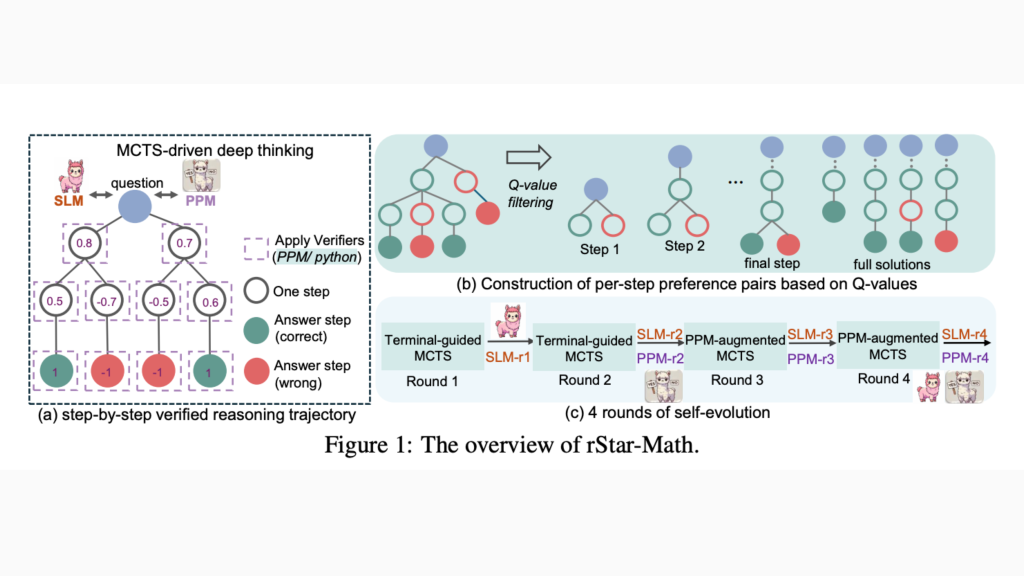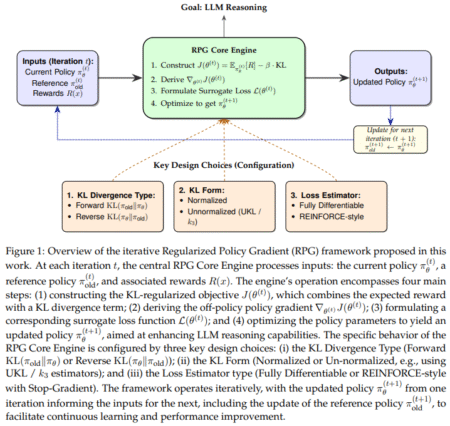

Mathematical problem-solving has long been a benchmark for artificial intelligence (AI). Solving math problems accurately requires not only computational precision but also deep reasoning—an area where even advanced language models (LLMs) have traditionally faced challenges. Many existing models rely on what psychologists term “System 1 thinking,” which is fast but often prone to errors. This approach generates solutions in a single inference, bypassing the iterative reasoning process essential for tackling complex problems. Furthermore, training high-quality models relies on curated datasets, which are particularly scarce for competition-level math problems. Open-source methods frequently fail to exceed the capabilities of their “teacher” models, leading to limited progress. Consequently, the development of efficient AI systems capable of addressing these challenges has remained elusive.
Microsoft introduces rStar-Math, a self-evolvable System 2-style reasoning framework designed to enhance mathematical problem-solving in small language models (SLMs). With a compact model size of just 7 billion parameters, rStar-Math demonstrates performance that rivals and occasionally surpasses OpenAI’s o1 model on challenging math competition benchmarks. This system leverages Monte Carlo Tree Search (MCTS) and self-evolution strategies to strengthen the reasoning capabilities of SLMs.
Unlike traditional methods that depend on distillation from larger models, rStar-Math enables small models to independently generate high-quality training data through a step-by-step reasoning process. The framework employs a code-augmented chain-of-thought (CoT) data synthesis, a process preference model (PPM), and iterative self-evolution techniques. These advancements allow rStar-Math to achieve notable accuracy across benchmarks, including the MATH dataset and the USA Math Olympiad (AIME), where it ranks among the top 20% of high school students.

Technical Innovations and Benefits
rStar-Math’s success is underpinned by three core innovations:
- Code-Augmented CoT Data Synthesis:
- The system uses MCTS rollouts to generate step-by-step verified reasoning trajectories. This method ensures that intermediate steps are validated through Python code execution, filtering out errors and improving overall data quality.
- Process Preference Model (PPM):
- Unlike conventional reward models, PPM employs pairwise ranking to optimize reasoning steps. This approach avoids noisy annotations and offers fine-grained feedback for step-level optimization, resulting in more reliable intermediate evaluations.
- Self-Evolution Recipe:
- Through four iterative rounds of self-evolution, rStar-Math progressively refines its policy model and PPM. Starting with a dataset of 747,000 math problems, the system generates millions of high-quality solutions, tackling increasingly challenging problems and enhancing reasoning capabilities with each iteration.
These innovations make rStar-Math a robust tool for both academic and competition-level math challenges. Additionally, by enabling smaller models to self-generate data, it reduces reliance on large, resource-intensive models, broadening access to advanced AI capabilities.
Results and Insights
rStar-Math has redefined benchmarks for small models in math reasoning. On the MATH dataset, it achieves 90.0% accuracy, a significant improvement over the previous 58.8% accuracy of Qwen2.5-Math-7B. Similarly, its performance on Phi3-mini-3.8B improves from 41.4% to 86.4%, representing a notable advancement over OpenAI’s o1-preview model.
In the AIME competition, rStar-Math solves 53.3% of problems, placing it among the top 20% of high school participants. Beyond competitions, the system excels across benchmarks such as Olympiad-level math, college-level problems, and the Gaokao exam, outperforming even larger open-source models. These results highlight its ability to generalize across diverse mathematical challenges.

Key findings from the study include:
- Step-by-Step Reasoning Improves Reliability: Verified reasoning trajectories reduce errors in intermediate steps, enhancing overall model performance.
- Emergence of Self-Reflection: rStar-Math exhibits the ability to self-correct flawed reasoning paths during problem-solving.
- Importance of Reward Models: The PPM’s step-level evaluations play a critical role in achieving high accuracy, emphasizing the value of dense feedback signals in System 2 reasoning.
Conclusion
Microsoft’s rStar-Math highlights the potential of small language models in addressing complex mathematical reasoning tasks. By combining code-augmented synthesis, innovative reward modeling, and iterative self-evolution, the framework achieves remarkable accuracy and reliability. With 90.0% accuracy on the MATH dataset and strong performance in AIME competitions, rStar-Math demonstrates that smaller, efficient models can achieve competitive results.
This advancement not only pushes the boundaries of AI capabilities but also makes sophisticated reasoning models more accessible. As rStar-Math evolves, its potential applications could expand beyond mathematics into areas like scientific research and software development, paving the way for versatile, efficient AI systems to address real-world challenges.
Check out the Paper. All credit for this research goes to the researchers of this project. Also, don’t forget to follow us on Twitter and join our Telegram Channel and LinkedIn Group. Don’t Forget to join our 60k+ ML SubReddit.
 FREE UPCOMING AI WEBINAR (JAN 15, 2025): Boost LLM Accuracy with Synthetic Data and Evaluation Intelligence–Join this webinar to gain actionable insights into boosting LLM model performance and accuracy while safeguarding data privacy.
FREE UPCOMING AI WEBINAR (JAN 15, 2025): Boost LLM Accuracy with Synthetic Data and Evaluation Intelligence–Join this webinar to gain actionable insights into boosting LLM model performance and accuracy while safeguarding data privacy.
The post Microsoft AI Introduces rStar-Math: A Self-Evolved System 2 Deep Thinking Approach that Significantly Boosts the Math Reasoning Capabilities of Small LLMs appeared first on MarkTechPost.
Source: Read MoreÂ




